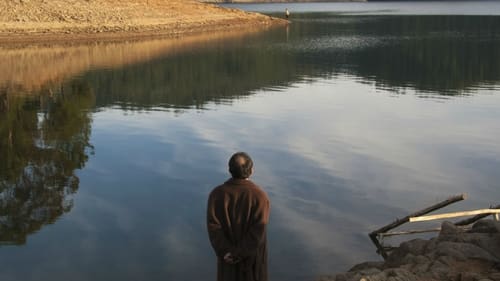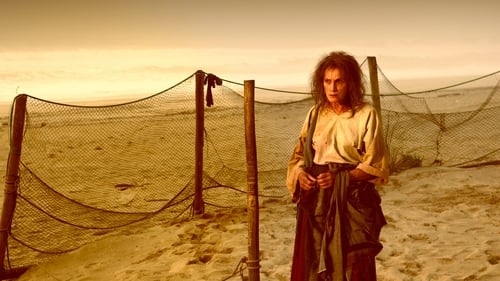João Viana
出生 : , Huambo, Angola
略歴
João Viana graduated in law at the university of Coimbra and studied cinema in Porto (1988/1994). He worked in the areas of production, sound, story-board, direction e script-writing. In 2007 he wrote the script Olhos Vermelhos for film-director Paulo Rocha, obtaining the first prize in the contest for feature films of the ICA. He worked with film director like Oliveira, Biette, César Monteiro, Schroeter, José Alvaro, Seixas Santos and technicians like Bonfanti and Joaquim Pinto… He was one of the authors (2005/2007) of the Dicionario de cinema Iberoamericano, in 10 volumes, published by the SGAE, Madrid, and edited by Bénard da Costa of the Cinemateca Portuguesa. He started to direct his own films, with Iana, in 2004 with the film A Piscina (in competition at the Venice Film Festival) “the Portuguese fictional short film that won the most awards ever” (Central de Informação).

Producer
Ernania is hospitalized in a psychiatric hospital in Mozambique. She dreams about her little son, Hanic, and her husband, Pak, who is a soldier of the war. In the meantime, a quirky musical instrument plays: her own bed. Ernania’s musical virtuosity, attracts the attention of the hospital nurses. One day, her song is played in a radio program and Rosa, an evangelical priest of “Rádio Moçambique”, goes to the hospital to listen to Ernania’s song. Ernania takes the priest’s visit as an opportunity to run away from the hospital.

Screenplay
Ernania is hospitalized in a psychiatric hospital in Mozambique. She dreams about her little son, Hanic, and her husband, Pak, who is a soldier of the war. In the meantime, a quirky musical instrument plays: her own bed. Ernania’s musical virtuosity, attracts the attention of the hospital nurses. One day, her song is played in a radio program and Rosa, an evangelical priest of “Rádio Moçambique”, goes to the hospital to listen to Ernania’s song. Ernania takes the priest’s visit as an opportunity to run away from the hospital.

Director
Ernania is hospitalized in a psychiatric hospital in Mozambique. She dreams about her little son, Hanic, and her husband, Pak, who is a soldier of the war. In the meantime, a quirky musical instrument plays: her own bed. Ernania’s musical virtuosity, attracts the attention of the hospital nurses. One day, her song is played in a radio program and Rosa, an evangelical priest of “Rádio Moçambique”, goes to the hospital to listen to Ernania’s song. Ernania takes the priest’s visit as an opportunity to run away from the hospital.

Writer
Lucy, regarded as crazy, has a son.

Director
Lucy, regarded as crazy, has a son.

Producer
Certainly an outstanding case of beauty and mystery, this short film by Mozos creates a strange alloy of literature and cinema, and not in the way one discipline is a vampire for the other, but rather as if they were the different faces of the same coin, drawn to coexist and repel each other. As if every film belonged to a lonely species, Ashes and Embers shows a unique arrogance as it trembles, somewhat defenseless, with no certainty that the folds of fiction constitute any kind of survival guarantee for such strange objects. Memory and ghosts are two words that are easily said, but in this singular and very refined film they seem destined to become the ultimate goal of cinema, and its most endurable desire.

In mid-summer 2011, Paulo Carneiro and set out as assistant director for a film crew working on a project on the west African coast. There he unexpectedly ended up shooting his own film, a documentary report about a sinking ship near the coast of Guinea-Bissau on which he was a passenger. The digital camera records the growing panic on the ship after it has gotten stuck in the ocean in an oppressive nighttime atmosphere. In shaky interview footage, we see passengers move from an initial apathy to nervous anxiety, and from there fluidly to a fear for their lives. The growing tension on board is reflected in the film's ever quickening tempo.

Director
Mutar, who fought in the war, is back in Guinea. In his luggage, he brings strange objects. Fatu, his daughter, takes the opportunity of Mutar's absence to open his bag. Shortly afterwards, Fatu's boyfriend Idrissa finds Mutar with his hand soiled in blood and Fatu dead. It is then that Idrissa picks up a drum.

Screenplay
1920s. Vitalino, a small farmer from São Vicente sees his father die of the epidemic which decimated the country. Some years later, of all the brothers, Vitalino is the strongest and takes his father’s place in the house. But the village is too small for his aspirations and he decides to head to Brazil, leaving his sisters in charge of the household. In parallel with Vitalino’s story, If I Were a Thief… I’d Steal portrays the world of Paulo Rocha rummaging through his films and ghosts over the years.

Producer
Fatu’s father has returned home to Guinea-Bissau from Portugal to attend her wedding. The young woman teaches at the university and her future husband is a well-known musician. Their wedding is supposed to take place in Tabatô, a village where everyone makes music. On the way there, it becomes apparent that the father is seriously traumatised by his experiences as a soldier in the colonial war decades earlier.

Screenplay
Fatu’s father has returned home to Guinea-Bissau from Portugal to attend her wedding. The young woman teaches at the university and her future husband is a well-known musician. Their wedding is supposed to take place in Tabatô, a village where everyone makes music. On the way there, it becomes apparent that the father is seriously traumatised by his experiences as a soldier in the colonial war decades earlier.

Director
Fatu’s father has returned home to Guinea-Bissau from Portugal to attend her wedding. The young woman teaches at the university and her future husband is a well-known musician. Their wedding is supposed to take place in Tabatô, a village where everyone makes music. On the way there, it becomes apparent that the father is seriously traumatised by his experiences as a soldier in the colonial war decades earlier.

Director
João Viana, the crisis of cinema in one minute. On July 2010 the Portuguese Association of Directors challenged the Portuguese directors to do a sixty seconds long film with their own means of production. “Due to the lesser and weaker attention of the governments of this country to the Arts and Culture, where the lower budget is invested and with the goal to achieve improvements in the cultural policies, (…) we propose a challenge to direct a film that is a statement, an individual and completely free glance that will respond to the serious situation of the support of the Arts.

Producer
A and B get on the train, full of excitement Love and jealousy/Ashes and fire/Pain and sin Just before it leaves, C boards too. All this exists / All this is sad / All this is fado.

Director
A and B get on the train, full of excitement Love and jealousy/Ashes and fire/Pain and sin Just before it leaves, C boards too. All this exists / All this is sad / All this is fado.

Writer
The way in which we cross, one time only, the space of a public swimming pool reminds us of life, from birth until the end.

Director
The way in which we cross, one time only, the space of a public swimming pool reminds us of life, from birth until the end.



